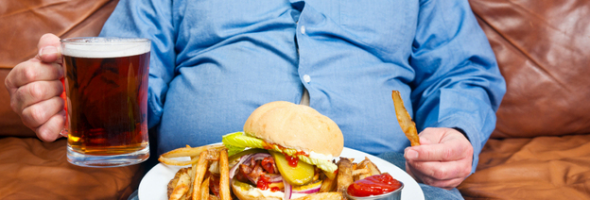Health Disconnect: is Gen Y putting themselves at higher risk for stroke and cardiovascular disease?

I came across this survey recently released by the American Stroke Association.
The survey found that nine out of ten young adults between the ages of 18 and 24 believe that they are living healthy lifestyles. Yet in reality they are not. Adults in this age group tend to eat too many unhealthy foods, drink too much alcohol, and do not exercise enough. Although this age group stated that they wanted to live long healthy lives, living to an average age of 98, their health behaviors now do not reflect that wish. In fact, one third of those surveyed did not believe that engaging in healthy behaviors now as a young adult could actually affect their risk of stroke as they age.
Dr. Ralph Sacco, a neurologist and President of the American Heart Association/American Stroke Association was quoted in the above article saying, “Young adults need to make a connection between healthy behaviors and a healthy brain and healthy heart…if we are not able to help young adults understand the relevance of their actions now and their risk of stroke tomorrow, then we could be looking at an increase in stroke diagnoses and deaths within the next 10 to 20 years.”
The survey brought attention to the serious disconnect that many young adults have between how their health behaviors now can affect their risks for serious and preventable diseases in the future.
I talked to a group of Tulane medical students about their thoughts on the study and asked them this question: Are young adults really as naive about their health and health choices as the results of this survey made them out to be?
The consensus of our conversation was interesting. Yes, they believe young adults generally try to be healthy to the best of their ability. But no, young adults are not always healthy and do not necessarily think of chronic and preventable diseases such as stroke and cardiovascular disease. When they are healthy it isn’t necessarily for the sake of their “health,” but rather to fit in their favorite pair of skinny jeans, to look good in a swimsuit on Spring Break, or to impress their friends at the gym (but hey, although these reasons aren’t necessarily the “best” reasons to live a healthy lifestyle, I personally think that any reason you may have to keep yourself healthy is a good one!).
So what makes it so difficult for us to realize that our health choices now can increase our risk for stroke in the future?
The “young and invincible” mentality seems to be key.
“I think very few people our age think about that stuff, we do feel like we’re invincible. I think we make a lot of decisions, not just health related decisions about food and exercise, but just decisions in general where we think we are invincible and can live forever” John Wang, a Tulane medical student, said.
Denise Ammon, another Tulane medical student, suffers from high cholesterol. She shared her difficulty with maintaining the preventive measures that have been recommended for her.
“I think about it, I know how bad it is. But at the end of the day, if I want pizza I’m going to eat pizza,” Denise said. “My cholesterol isn’t bad enough where I have to take medication yet, but they did recommend me to take fish oil supplements and I started doing it but now I don’t. I don’t know what it would take for me to take it, it’s hard, you know?”
Of course, this was a Tulane University medical student population that I spoke with. This group is educated in healthy choices, knows the clear difference between an unhealthy and healthy lifestyle, and is even studying to be physicians in order to educate others about their health. Not quite your “average” young adult in America. But as was seen in our conversation, even they admitted to falling victim to the “young and invincible” mentality.
So how late is too late to concern ourselves with maintaning healthy lifestyles as a preventive measure for disease? Dr. Linda Kirby, medical director of Tulane’s Student Health Primary Care Clinic, shares her thoughts.
“I think some people are genetically prone to get early onset heart attacks, like in their early 40s…I would say that if you are at risk of that, you’ve got to start exercising and stop eating bad foods,” Dr. Kirby said. “The question becomes how much damage can you do at a young age and how much damage can you reverse? If you start exercising when you’re 50, what have you already done to your body and is it reversible? I don’t know if anybody has ever studied that.”
Dr. Kirby offers a few suggestions to help improve the young adult’s lifestyle.
“Young adults need to be getting at least 20 minutes of cardiac exercise three times per week. This doesn’t have to be strenuous exercise. They can do it by walking. They also need to increase their fruits and vegetables and decrease fatty and deep fried foods. But what is often forgotten about is sleep. If you aren’t getting enough sleep, you release stress hormones, and you crave carbohydrates and fatty foods,” Kirby said.
For more information about stroke and cardiovascular disease prevention, visit the American Heart Association recommendations here.
Photo by Ken Levy, LA Times
Posted under Featured by hollyonhealth
















